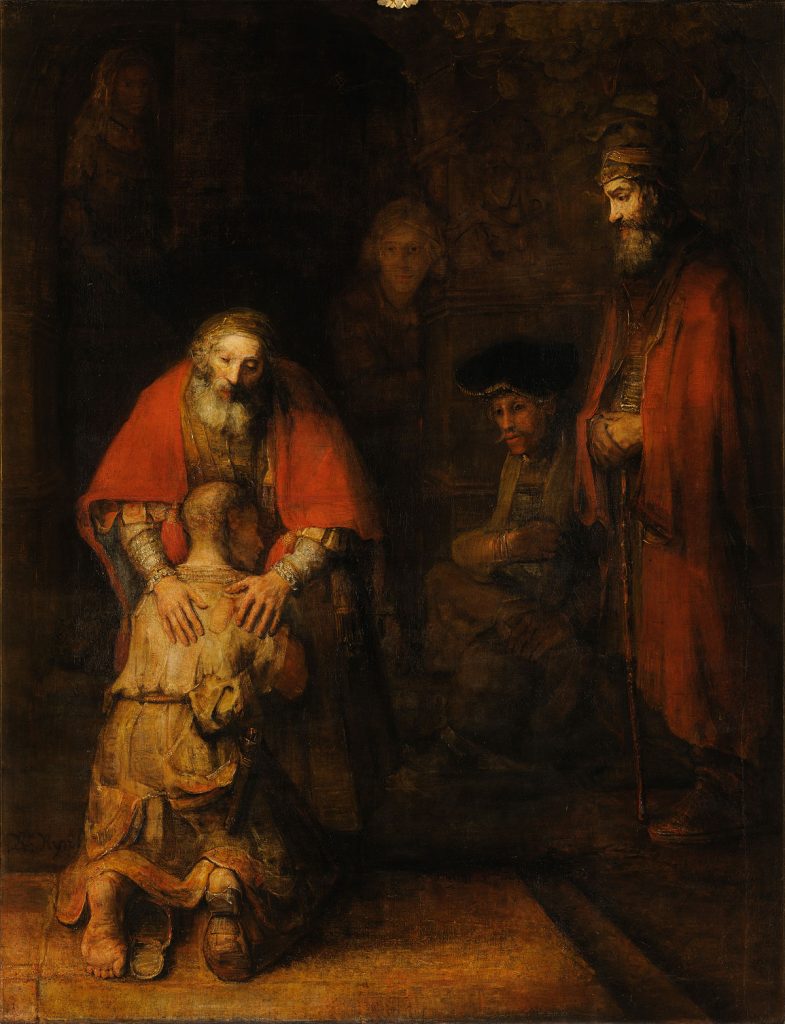This Tuesday we will gather to discuss “Part III: The Father” of Henri Nouwen’s book The Return of the Prodigal Son: A Story of Homecoming. Please read chapters 7-9 of Nouwen and chapter 4 of Bailey’s The Cross and the Prodigal (pp.66-74). As you read through chapter 7 of Nouwen, please have Rembrandt’s painting before you and contemplate how Rembrandt portrays the father. Look at how the son is placed against the father’s heart and the protective posture and forgiving expression on the father’s face. Pay particular attention to the differences between the father’s hands, and think through the different representations and functions of the two hands. The father’s left hand is masculine and grasps the son tight, whereas the right hand is feminine and rests gently on the younger son to comfort him as only a mother can. Isa. 66:13.
Traditionally, the Church has seen this parable of the Prodigal Son as one of the most important parables told by Jesus. However, Bailey tells us on p.69 and in THIS ARTICLE, that Islamic scholars latched onto this parable because it shows that there is no need for a Mediator between God and an individual, and particularly, no need for the Incarnation, Atonement, or the Cross. Therefore, as you read through the parable again as well as through the above readings, think through where these essential elements of the gospel can be found in the parable. Where is Jesus in the parable? And how does the parable speak to the Incarnation and the Cross?
Dinner is at 6. The menu is beef bulgogi. Discussion about 6:45. Hope to see you here.
“For the kingdom of heaven is like a householder who went out early in the morning to hire laborers for his vineyard. After agreeing with the laborers for a denarius a day, he sent them into his vineyard. And going out about the third hour he saw others standing idle in the market place; and to them he said, ‘You go into the vineyard too, and whatever is right I will give you.’ So they went. Going out again about the sixth hour and the ninth hour, he did the same. And about the eleventh hour he went out and found others standing; and he said to them, ‘Why do you stand here idle all day?’ They said to him, ‘Because no one has hired us.’ He said to them, ‘You go into the vineyard too.’ And when evening came, the owner of the vineyard said to his steward, ‘Call the laborers and pay them their wages, beginning with the last, up to the first.’ And when those hired about the eleventh hour came, each of them received a denarius. Now when the first came, they thought they would receive more; but each of them also received a denarius. And on receiving it they grumbled at the householder, saying, ‘These last worked only one hour, and you have made them equal to us who have borne the burden of the day and the scorching heat.’ But he replied to one of them, ‘Friend, I am doing you no wrong; did you not agree with me for a denarius? Take what belongs to you, and go; I choose to give to this last as I give to you. Am I not allowed to do what I choose with what belongs to me? Or do you begrudge my generosity?’ So the last will be first, and the first last.”
Matthew 20:1-16

